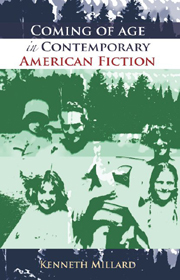Book contents
- Frontmatter
- Contents
- Acknowledgements
- Introduction: Contemporary Coming of Age – Subject to Change
- 1 In the Name of the Father
- 2 I Change Therefore I Am: Growing up in the Sixties
- 3 Citation and Resuscitation
- 4 Language Acquisition: Life Sentences
- 5 Lexicon of Love
- 6 Memoirs and Memorials
- Conclusion
- Bibliography
- Index
6 - Memoirs and Memorials
Published online by Cambridge University Press: 12 September 2012
- Frontmatter
- Contents
- Acknowledgements
- Introduction: Contemporary Coming of Age – Subject to Change
- 1 In the Name of the Father
- 2 I Change Therefore I Am: Growing up in the Sixties
- 3 Citation and Resuscitation
- 4 Language Acquisition: Life Sentences
- 5 Lexicon of Love
- 6 Memoirs and Memorials
- Conclusion
- Bibliography
- Index
Summary
The coming-of-age novel is traditionally a narrative in which its protagonist progresses from naive or callow youth towards a sense of a mature adult consciousness and fulfilling social integration. The narrator finds their self and their sense of a proper place in society, as a consequence of working through the challenges of adolescence. But what does a true and satisfactory achievement of adulthood consist of, and how can it be known or evaluated? In a piece of writing such as a novel, how does an author find a satisfactory language by which to articulate a sense of the authentic self and a fulfilling resolution of the vicissitudes of adolescence? What investments in a particular language of subjectivity does this involve, and how is it possible to know, or to evaluate, that concept of the self which the novelist's language hopes to bring to life?
The novels of this chapter are both first-person narratives of childhood and adolescence that are characterised principally by pain, violence, and other forms of physical and emotional anguish. Where Prozac Nation asks questions about the nature of illness and the concept of the ‘real’ person who is to be uncovered by the remedy for that illness, Bastard out of Carolina depicts a child in impossibly difficult circumstances whose coming of age is profoundly affected by physical abuse. Both texts depict children in positions of extreme powerlessness, and it is that very powerlessness which defines them, and which they attempt to overcome by writing these works of self-realisation.
- Type
- Chapter
- Information
- Coming of Age in Contemporary American Fiction , pp. 154 - 180Publisher: Edinburgh University PressPrint publication year: 2007



